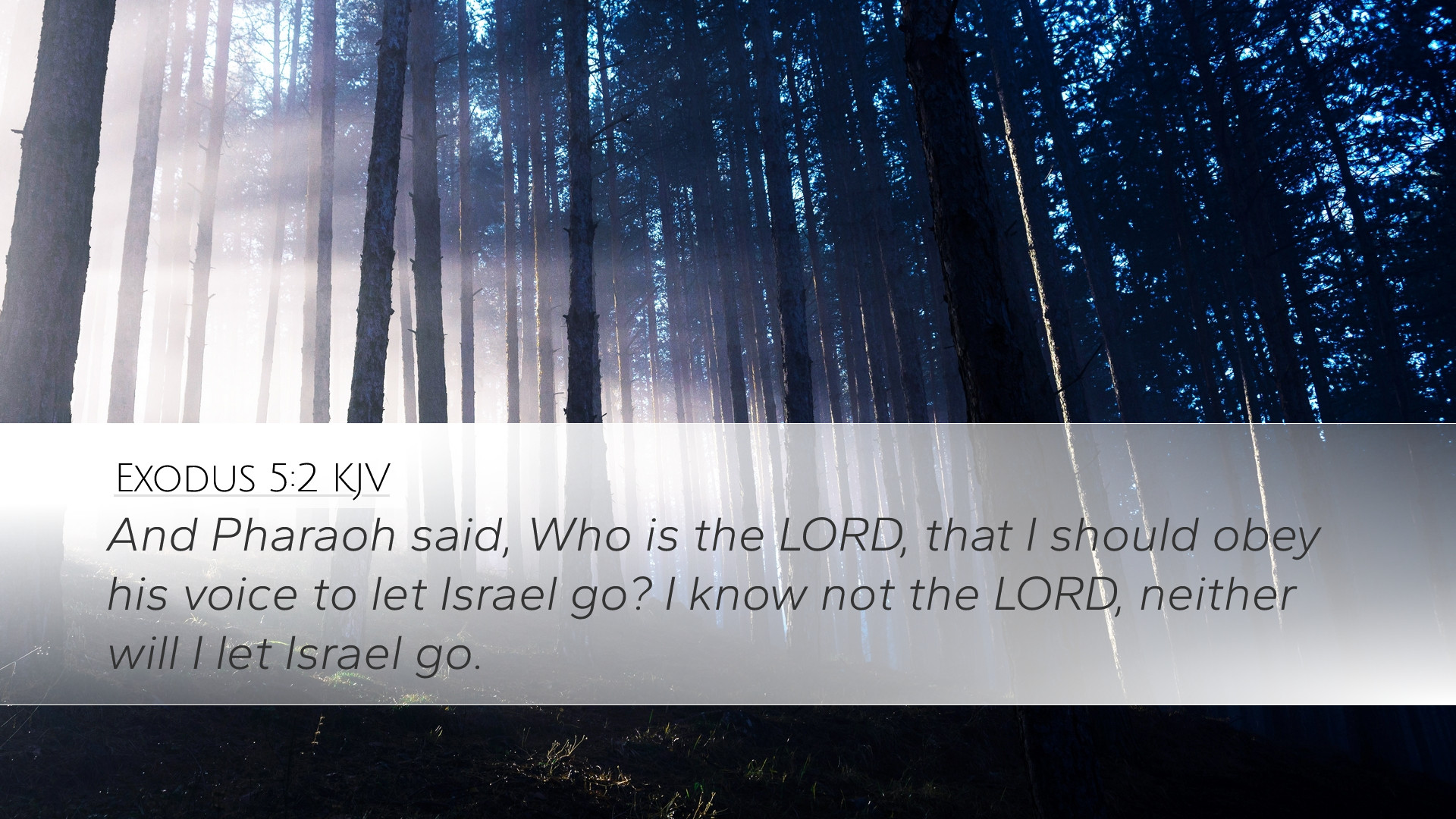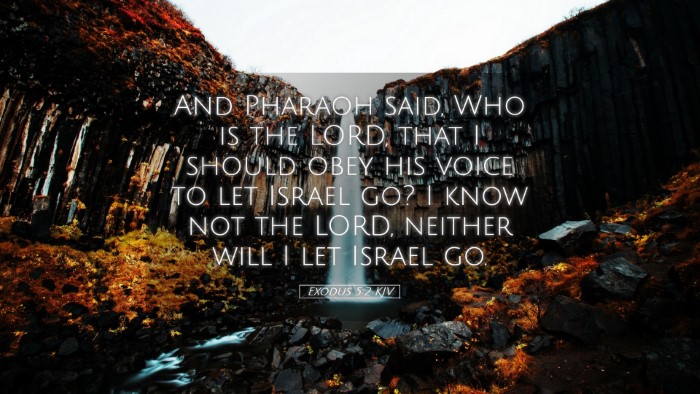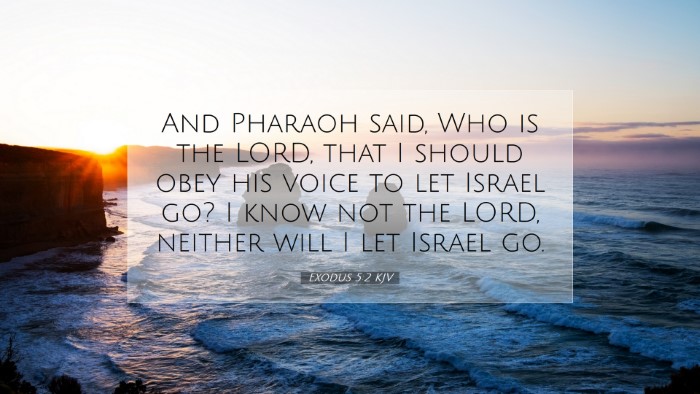Commentary on Exodus 5:2
Exodus 5:2 reads, "And Pharaoh said, Who is the LORD, that I should obey his voice to let Israel go? I know not the LORD, neither will I let Israel go." This verse is pivotal in understanding the nature of Pharaoh's resistance to Moses and the liberating mission for the Israelites. In this commentary, we will explore the insights of several prominent public domain commentators, providing a comprehensive analysis relevant for pastors, students, theologians, and Bible scholars.
Contextual Background
Exodus 5 marks a significant moment in the narrative of the Exodus, as Moses and Aaron approach Pharaoh to demand the release of the Israelites from slavery. Understanding the context in which this dialogue occurs is essential. The Israelites have been in bondage for generations, and Moses is fulfilling his divine commission to confront Pharaoh. This moment reflects the interplay between divine authority and human pride.
Insights from Matthew Henry
Matthew Henry provides a profound examination of the heart of Pharaoh's response. He emphasizes that Pharaoh's question, "Who is the LORD?", demonstrates his disdain and ignorance. Henry notes that Pharaoh’s position as a powerful monarch leads him to dismiss the authority of God:
- Spiritual Ignorance: Henry points out that Pharaoh's ignorance of God is not just personal but reflects broader spiritual blindness. It highlights the nature of humanity's rebellion against divine authority.
- Human Pride: Henry discusses how pride often blinds individuals to spiritual truths. Pharaoh, relying on his own power and the status of the Egyptian gods, refuses to recognize the supremacy of the God of Israel.
Insights from Albert Barnes
Albert Barnes adds to the discussion by examining the implications of Pharaoh's statement concerning obedience to God:
- Authority of God: Barnes highlights that Pharaoh's refusal to obey God's command exemplifies a broader theme of humanity's reluctance to submit to divine authority.
- Contrasting Goals: He notes a stark contrast between Pharaoh's aspirations for power and God’s intentions for liberation. This conflict sets the stage for the ensuing plagues and God’s ultimate display of power.
Insights from Adam Clarke
Adam Clarke's commentary delves into the motivations behind Pharaoh's dismissive attitude:
- Political Motivations: Clarke asserts that Pharaoh's resistance stems not only from arrogance but also from a political calculation. Letting the Israelites go could undermine his authority and destabilize his kingdom.
- Cultural Context: Clarke also emphasizes the cultural backdrop, explaining that the Egyptians had a plethora of gods and that their polytheistic beliefs contributed to Pharaoh’s rejection of the singular God of Israel.
Theological Reflections
The theological implications of Exodus 5:2 are profound and multifaceted:
- God’s Sovereignty: This confrontation highlights God’s sovereignty over nations. Even the most powerful rulers are ultimately subordinate to His will.
- The Nature of Revelation: Pharaoh's question points to a critical theme in Scripture regarding the revelation of God. God desires to make Himself known, yet human sin can result in rejection and ignorance.
- Faith and Obedience: The verse prompts serious introspection about the nature of faith and obedience. Just as Pharaoh questioned God's authority, individuals today face similar crossroads in their relationship with God.
Application for Modern Believers
Exodus 5:2 serves as a reminder for modern believers regarding their own relationship with authority, both divine and earthly:
- Recognizing God’s Authority: Believers must actively consider who they recognize as the authority in their lives. Just as Pharaoh's authority was challenged, so too should modern individuals reflect on their submission to God's will.
- Responding to God's Call: The passage encourages a heartfelt response to God's call, just as Moses and Aaron responded. Believers must not allow pride or human reasoning to obstruct their obedience.
- Engagement with the World: The interaction between Moses and Pharaoh invites modern believers to engage with a world often resistant to God’s truth. It calls for courage and conviction in proclaiming the message of the Gospel.
Conclusion
Exodus 5:2 is a powerful verse that encapsulates the conflict between divine authority and human pride. Through the comprehensive analysis offered by Matthew Henry, Albert Barnes, and Adam Clarke, we gain valuable insights into the nature of God, the challenges faced by His messengers, and the implications for our own faith journey. As we reflect on this verse, may we be inspired to recognize God's authority in our lives, respond to His call with faith, and courageously proclaim His truth in a world that often echoes Pharaoh's dismissive question: "Who is the LORD?"


